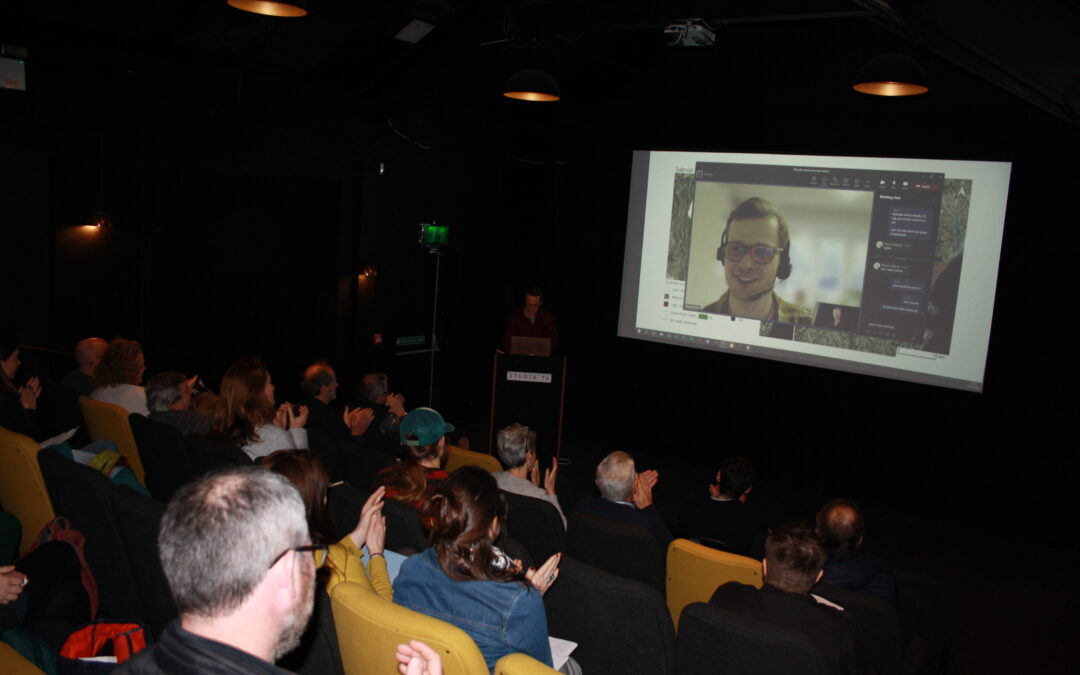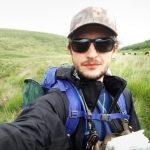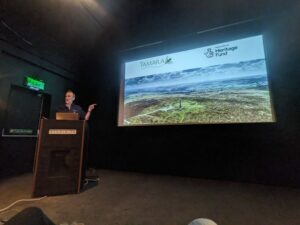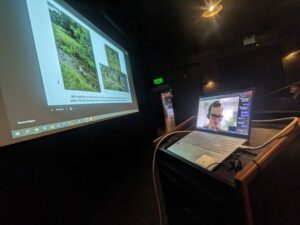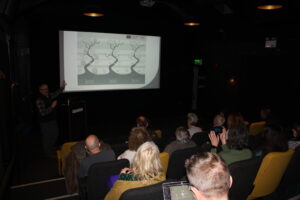Bruno Vincent, Project Lead provides a recap of the Water for Growth celebration event, marking the culmination of this long-standing project.
As Water For Growth (W4G), our six-year ERDF funded project for Cornwall, ends, we organised a mini-conference to discuss Natural Capital. The project was a major investment to Cornish rivers and the businesses that benefit from healthy waterways (read more here), but rather than discuss Natural Capital metrics for “the appropriate pricing of a single salmon, tree, wetland”, talks about the more experiential value of nature was curated.
The benefits of getting out in blue and green spaces are well-proven, however, access is increasingly difficult. Time in nature can be even more rewarding when engaging with the improvement of these spaces, so on 18 January, 10 inspiring speakers and a slightly reduced group of guests (ironically extreme weather got in the way) met in Exeter to discuss citizen science, wellbeing, cultural exploration of the environment and some technology to aid these endeavours.
W4G funded the development of the Fish Pass app, which I presented in its ‘final’ state. This app reduces the administrative burden of simple PES (Payment for an Ecosystem Service) angling schemes, and the talk focused on keeping things simple and iterating development based on real-world evidence data. https://fishpassapp.co.uk
Claire Wallerstein from Cornwall Climate Care talked about her evolution from founding a volunteer community plastic pollution group to a more holistic climate change awareness film company. https://www.cornwallclimate.org/
The Tamara Landscape Partnership was represented by William Darwell, who highlighted their many cultural and accessible projects throughout the Tamar valley, especially the Tamar Coast to Coast way. https://tamaralandscapepartnership.org.uk/
We had student research from Bertie Warren from the University of Bournemouth, Duncan Phillpot from the Swedish University of Agricultural Sciences and Brandon Mumford from the University of Plymouth. Respectively, they discussed;
- Using citizen science data within academic research to identify biological and ecological drivers of juvenile salmon production
- Collecting high resolution topographical data with drones for measuring geomorphological change in rivers
- Exploring whether social media records of Barbel angling show a wider distribution than the NBN Atlas dataset.
After lunch, Vicky Whitworth from the Chardstock Eco Group talked about how and why their grassroots river restoration group came about and the behavioural changes she’s seen in the community since the river has been in focus for more than just flood damage.
Our operations director, Bruce Stockley, gave us a rundown of all the work Water For Growth has achieved such as weir works, habitat creation, local enterprise support and Fish Pass. https://wrt.org.uk/project/water-for-growth/
Ian Dickie of eftec explained how their work as environmental economists will be examining Water for Growth for its socio-economic benefits and natural capital value efficacy. https://www.eftec.co.uk/
To wrap the day up, guerrilla geographer Daniel Raven Ellison, ran us through his lockdown inspired project to map a modern network of walking roots between cities and towns using citizen science. https://beta.slowways.org/
Natural capital is a huge and multifaceted sphere where everyday people can easily be left behind during complex conversation topics like the monetary value of individual ecosystem services.
In reality, the value of nature is so much more than this and combining technological innovation, environmental engagement and a good long walk in the countryside (or green urban spaces) can have social benefits that are even harder to quantify.
Hopefully, the event helped uncover the priceless importance of those neglected facets and gave inspiration and new vigour to the countless volunteers trying to improve our environment.
——————————————————————————————————————————————
The project has received £1.6 million of funding from the England European Regional Development Fund as part of the European Structural and Investment Funds Growth Programme 2014-2020. The Ministry of Housing, Communities and Local Government (and in London the intermediate body Greater London Authority) is the Managing Authority for European Regional Development Fund. Established by the European Union, the European Regional Development Fund helps local areas stimulate their economic development by investing in projects which will support innovation, businesses, create jobs and local community regenerations. For more information visit https://www.gov.uk/european-growth-funding.

